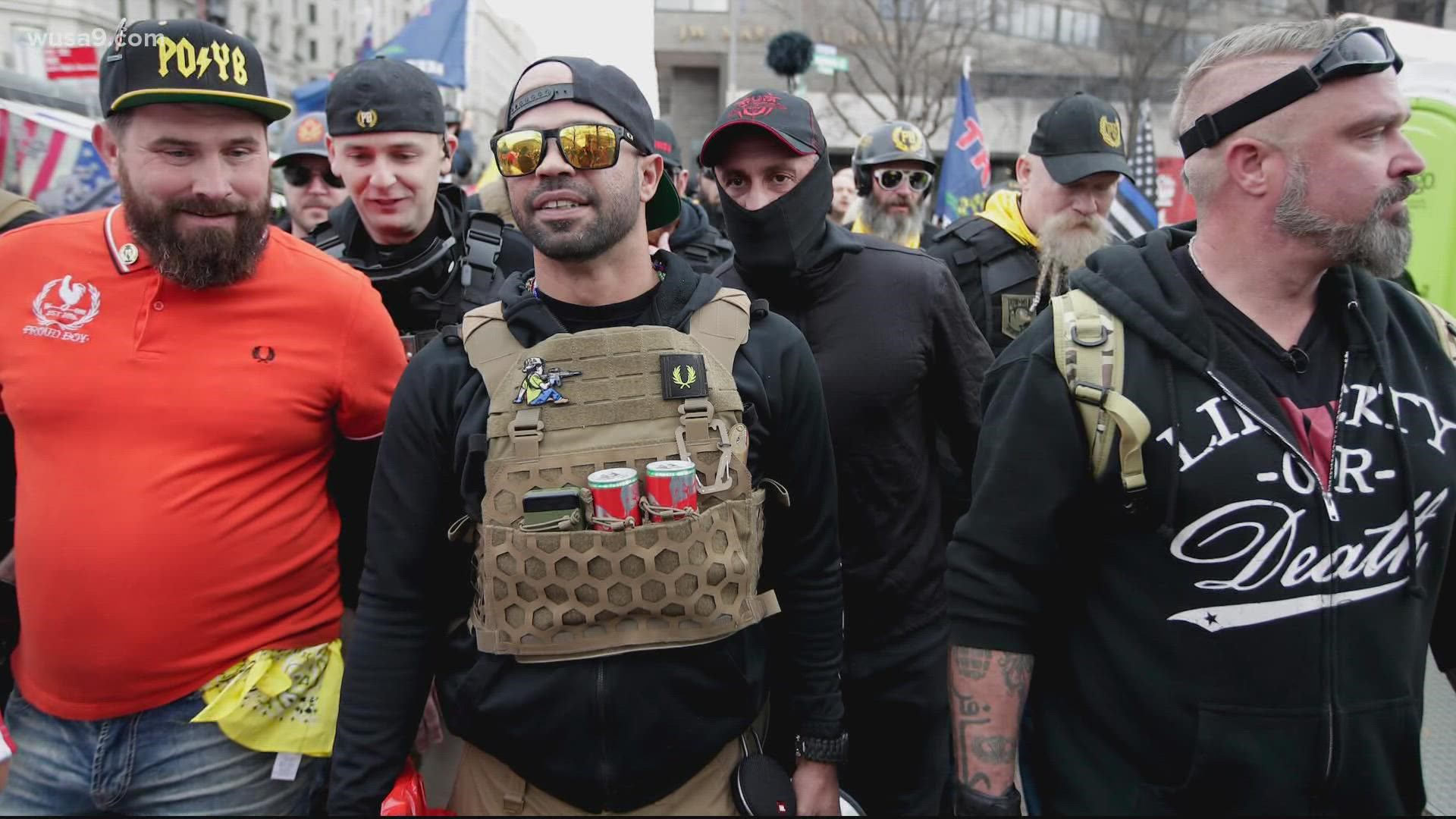WASHINGTON — The attorney for a former U.S. Army reservist wants to question potential jurors next month about their views on Adolf Hitler and Nazism – an attempt to get ahead of damning evidence about his client’s alleged anti-Semitic and white supremacist views.
Federal prosecutors and attorney Jonathan Crisp filed their joint proposed voir dire motion Friday laying out the questions potential jurors could be asked next month when Crisp’s client, Timothy Hale-Cusanelli, goes to trial on seven counts in connection with the Capitol riot. Those counts include felony charges of civil disorder and obstruction of an official proceeding that could carry hefty prison sentences if he's convicted.
Hale-Cusanelli was working as a security officer at Naval Weapons Station Earle in Colts Neck, New Jersey, on Jan. 6 when he’s accused of joining the mob of Trump supporters who stormed the U.S. Capitol Building. Hale-Cusanelli was arrested less than two weeks after the riot and has been held in pretrial detention ever since – in no small part because of reports from dozens of coworkers that he was an avowed white supremacist and Nazi sympathizer and spoke approvingly about a coming civil war.
At least 34 coworkers told federal investigators that Hale-Cusanelli made no secret of his extreme anti-Semitic and racist beliefs, according to court documents. He was known to wear a Hitler-style mustache – a photo of which jurors are likely to see at trial – and to regularly post extremist rhetoric online. One Navy seaman who spoke with investigators recalled Hale-Cusanelli telling him that if he was a Nazi “he would kill all the Jews and eat them for breakfast.” Another Navy petty officer said he remembered Hale-Cusanelli saying, “Jews, women and Blacks were on the bottom of the totem pole.” Still another petty officer said he recalled Hale-Cusanelli telling him, “Hitler should have finished the job.”
Hale-Cusanelli is scheduled to begin trial on May 23. Ahead of that, his attorney, Crisp, submitted a series of questions he’d like to ask potential jurors in the case. While many of them have been standard in other Capitol riot trials – questions about whether jurors live or work near the Capitol, where they get their news, if they were personally affected by Jan. 6 – others are unique to Hale-Cusanelli’s particular alleged fascination with anti-Semitism and the Nazi Party. The questions include:
- Do you think someone who impersonates Adolf Hitler, satirical or otherwise, is a person who would want to overthrow the government?
- Do you think someone who is a white supremacist wants to overthrow the government?
- Do you think a Nazi sympathizer wants to overthrow the government?
- Do you think a person can express distrust with the government without wanting to overthrow it?
While the DOJ is opposing those questions, it will be up to U.S. District Judge Trevor McFadden to decide whether Crisp can ask them. According to former federal prosecutor Neama Rahmani, now president of West Coast Trial Lawyers, judges tend to lean toward the defense when it comes to questions about the jury selection process.
“I think what the judge may say is, you may hear evidence that Hale-Cusanelli was a white supremacist. Can you still decide whether he intended to overthrow the government by force?” Rahmani said. “That’s really the standard. Can you set apart those two? And that’s what the defense is asking for.”
From the DOJ’s perspective, Rahmani said, the case has nothing to do with race. It’s about a desire to overthrow the government – and Hale-Cusanelli’s extremist rhetoric shows the pumped was already primed when he came to D.C. on Jan. 6. The defense’s goal, Rahmani said, will be to try to separate those two things as much as possible.
“Basically what they’re arguing is, look, it’s possible to be a white supremacist Nazi sympathizer and not want to overthrow the government,” Rahmani said. “They want the jurors to say, listen, he can be a racist but not be guilty of insurrection.”
Prosecutors will have more than YouTube videos and alleged racist statements to make their case. According to court documents, Hale-Cusanelli admitted to a confidential source shortly after the right that he’d entered the Capitol and encouraged other members of the mob to advance, “giving directions via both voice and hand signals.” Hale-Cusanelli also alleged said if they’d had more men they could have taken over the entire building and said he’d taken a flag another rioter had thrown at an officer with the intent to destroy it. The conversation was recorded by the confidential source, and is likely to be a key piece of evidence in the government’s case against Hale-Cusanelli.
Hale-Cusanelli also has pending motions asking for the most serious charges against him to be dismissed or for a change of venue. For the former, Hale-Cusanelli has claimed former President Donald Trump ordered him an others to enter the Capitol building and has also cited a decision by McFadden that another defendant, Matthew Martin, showed it was “plausible” he believed police had allowed him into the building. To date, no Capitol riot defendants have had their trials moved out of D.C., and only one judge has agreed to drop the most serious obstruction charge against a single defendant.
We're tracking all of the arrests, charges and investigations into the January 6 assault on the Capitol. Sign up for our Capitol Breach Newsletter here so that you never miss an update.

